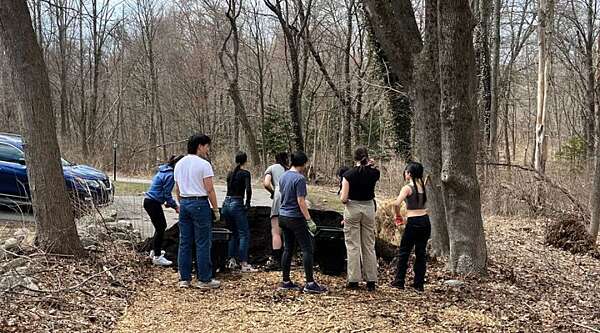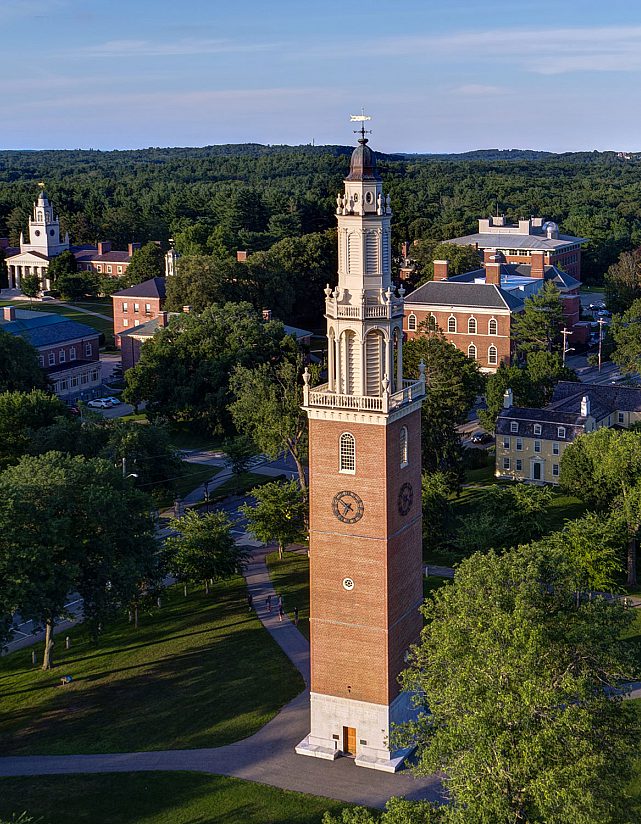
May 25, 2023
The Workshop Works
Gardening as part of the Workshop curriculum and ways of reimagining climate educationby Erin ’23
A student post from The Workshop 12*
Spotted: crabgrass tucked beneath strawberry leaves. Shovel in hand, I dug deeper and deeper until its seemingly unrelenting roots slowly surfaced from the dirt.
After tossing weed number one-hundred-and-something into the bucket, I stepped back to observe the entire garden from a distance.
Just a few hours ago, we found the garden as a hodgepodge of unidentifiable plants—it was hard to tell whether we were growing the weeds or the strawberries. But the garden we walked out of, later in the afternoon, was different. Fresh strawberry leaves glistened in the sunshine, and the hay we moved from the Community Garden gently blanketed the soil.
We made progress, each person in charge of weeding out one plot of land. With the culmination of our work before my eyes, it felt so joyful and rewarding to first-hand witness the difference we made, as one big team.
Gardening has easily been one of the most defining Workshop experiences for me. I’ve looked forward to it from the start. It’s new, unique, and exciting—after all, not many high schoolers don’t have “gardening” as part of their weekly class schedule. So, to me, gardening exemplified the Workshop’s innovative “experiments in education.”
After finishing Week 3 of Tuesday Gardening, I can say with certainty that learning can indeed happen outside the classroom, in the form of a non-traditional schedule.
During last week’s Weekly Synthesis session (where we essentially gather at the end of the week to reflect and share out about our experience in the workshop), a comment from Dr. Hughes resonated with me. Dr. Hughes said he was pleasantly surprised to see our group’s the laughter and positive energy after two full hours of hard work.
This made me reflect—what about gardening makes me so excited about Tuesdays?

There is the undeniable fact that gardening is extremely relaxing. It’s the small things in the process that bring me so much joy: smelling dirt, chatting with friends, nodding my head to “Mr. Brightside” blasting from the speaker, seeing piles of defeated crabgrass, and catching sight of an earthworm scrambling beneath the soil. All these factors combined, I come out of each week’s gardening session feeling a sense of enrichment of my mind, body, and soul.
Gardening also embodies the Workshop’s focus on our local community. Most “climate education” at the high school level involves learning taking place inside the classroom, usually through discussions about important global issues. However, gardening brought my attention to sustainability on the local level.
The fruits and vegetables we grew in the Abbot Learning Garden will leave a positive impact on our local spheres—some will be used on campus and most will be donated to a local community fridge and pantry. Furthermore, gardening cultivated a newfound appreciation for the staff members who take care of our campus, as well as local farmers whose work makes it possible for us to have healthy produce on our plates.
So, what do you think? Perhaps it might be worth considering adding gardening to our regular class schedule—it would be nice to leave behind the hustle and bustle of Andover life for a moment each week, to relax and reflect with a greater appreciation for the world around us.
The "With Liberty and Health for All: Humanities for Public Health” group includes Erin ’23, Sin ’23, Sammie ’23, Alice ’23.
__________________________________________________________________________
*THE WORKSHOP
Each spring term, The Workshop welcomes approximately 20 seniors to this interdisciplinary, project-based course. With an eye toward reimagining what school can be, The Workshop is the senior’s only academic commitment for the entire term. Instead of splitting their time and attention into units of distinct courses and fields of study, they work closely with peers, faculty, and community and global partners on a series of linked, interdisciplinary projects that revolve around a single theme. Within the theme Experiments in Education, students explore areas of personal interest.
During the first few weeks of the term, students are working on one of four faculty-led projects. We feature blog posts by students during this time.
- Inequality Visualized (led by Ellen Greenberg, instructor in Mathematics, Statistics, and Computer Science)
- Listening to the Buddhists in Our Backyard (led by Andy Housiaux, instructor in Philosophy and Religious Studies; director of the Tang Institute)
- With Liberty and Health for All: “Humanities for Public Health” (led by Corrie Martin, instructor in English)
- (Re)creating Kerouac: From Jean-Louis to Jack (led by Gene Hughes, instructor in French)
___________________________________________________________________________
The Tang Institute at Phillips Academy is a center for teaching, learning, and partnership. To learn more, follow us on Twitter and Instagram. Subscribe to our monthly newsletter, Notes on Learning.
